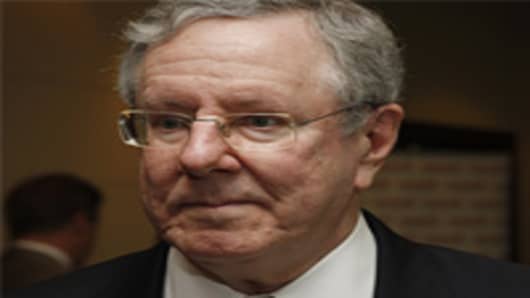Despite signs of an improvement for the U.S. economy, Steve Forbes, Chairman of Forbes Media says the recovery isn’t as vigorous as it should be and claims there’s a lot of disbelief about the turnaround.
A weak dollar , higher taxes and regulations from Obamacare and Dodd-Frank are holding back growth, Forbes, a former Republican candidate in the U.S. presidential primaries in 1996 and 2000, told CNBC Monday.
"We had a very vigorous recovery from the severe recession in the 1980s," Forbes said. "The recovery - this time - I don't think it's going to benefit the President very much, is the fact that it's not a vigorous one."
The rate of growth of 3 to 4 percent, coming off a severe recession should be 6-8 percent, he added. The end of Bush-era tax cuts on capital gains and dividends will also rein in the economy's expansion.
"If nothing is done, dividends go from 15 percent to 45 percent, capital gains from 15 percent to 24 percent," Forbes said. "Now, Congress will be in a mood to do something, but the President is not going to let those tax cuts of 10 years ago remain for upper income earners."
Economists Disagree on US Recovery
Several economists, including Former Treasury Secretary Larry Summers, have weighed in on recent data coming out from the U.S. Some say the economy might be finally out of the woods while others are less confident about the numbers.
The economy might have reached a 'turning point', Summers said in a Financial Times column on Monday. For the first time in five years, a resumption of growth that's significantly above the economy's potential "now appears a substantial possibility", he wrote.
"As winter turned to spring in 2010 and 2011, many observers thought they detected evidence that the economy had decisively turned, only to be disappointed a few months later," he said. "Several considerations suggest that this time may be different. Employment growth has been running well ahead of population growth for some time now."
Last week a former Federal Reserve Governor, Randall Kroszner told CNBC that Fed Chairman Ben Bernanke was right to be worried about a false dawn. Bernanke had told CNBC in the same week that there is some improvement in the economy, but there is still "a long way to go."
New York Fed President William Dudley also said while recent data on the U.S. economy have been a bit more positive, suggesting that the recovery may finally be somewhat 'firmer', economic activity is not yet strong or sustained enough to put a dent in unemployment numbers.
Forbes agrees, adding that the Fed’s low interest rates and Administration’s policies had sought to weaken the dollar, leading to a negative impact on the domestic economy.
"That's an illusion, what you gain, whatever you do to try and manipulate exports, you lose on what you do in your domestic economy: hurting investment and the like and it also distorts investment, which is just beginning to recover," Forbes said.


